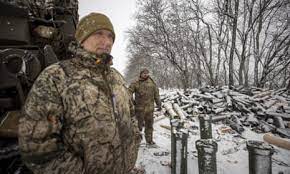Martin Kettle
Cut to the chase and give them the planes, demanded Boris Johnson during Monday’s Commons exchanges on Ukraine. Send them the fighter jets, insisted Liz Truss a few moments later during the same debate, as the two ex-prime ministers vied to flaunt the leadership qualities they lacked when they were actually in power.
If only the Ukraine war were as easily resolved as we armchair experts like to think. But it is not – and it won’t be when the fighting resumes soon either. The anniversary of Vladimir Putin’s invasion this week has provided a platform for a lot of well intentioned pontification. It’s often spot on, as Joe Biden’s was in Kyiv and Warsaw this week. Good for morale, undoubtedly. Not so good for objectivity, however, or for statecraft. We urgently need more of both on Ukraine. Take the example of planes. Sending fighter jets to aid Volodymyr Zelenskiy’s forces has been seized on by Johnson and Truss as the latest ratchet-up in their respective Churchill and Thatcher tribute-act contest at Westminster. But people who know about these things say that Britain’s Lightnings and Typhoons are in fact not easily serviceable in Ukrainian conditions. So what would we actually be giving them?
Meanwhile, a report on Wednesday on European air forces’ war-fighting credibility by the Royal United Services Institute’s Justin Bronk paints a far less gung-ho reality of what might really be involved in a Ukraine air war. Almost all European air forces, the RAF included, currently lack key capabilities that would enable them to gain and exploit air superiority over Russia, says Bronk. The planes are inadequately protected on the ground, and vulnerable to long-range missile attack. Their pilots, reared in peacetime patrolling, are not trained for high-intensity fighter missions. And the Europeans cannot credibly take out enough enemy air defences to gain aerial battlefield control. These defects can be remedied with enough time and money. But we don’t have endless amounts of either. Planes are also just one example. Before fighter jets it was battle tanks. Tanks, as I understand it, are a mobile battlefield gamechanger if everything else on which they depend for combined advances – signals, artillery, troops and air cover – is in place too. That’s not the case – not yet, anyway. If they get bogged down or isolated, tanks become targets, as the Russian tank crews discovered outside Kyiv a year ago.
The larger point, though, is that there is too often a gulf between the boosterish talk about how the Ukraine war can be won and the likely realities on the ground. This can lead to unguarded ambitions as well as oversimplification. Questioned about ammunition shortages, the foreign secretary, James Cleverly, promised airily on Monday that Britain’s manufacturers would have to “step up a gear”. What that actually means in practice is anybody’s guess. There is a similarly dangerous problem when politicians start virtue signalling about war aims and postwar dispositions. Whether the issue is Ukraine’s future territorial boundaries, Nato or EU membership, reparations from Russia, human rights trials or other sanctions, politicians would be wise to hold their tongues when they can. It is easy to play to the gallery over such a historic outrage as Putin’s war, but promises made now can be a hostage to fortune in an unpredictable future. Peace will impose different priorities.
History matters enormously. Russia is a huge country with enormous resources, including people. It has a historic sense of insecurity, not without justification, from which it has never fully been able to escape. In 1946 the American diplomat George Kennan, often seen as the architect of the US cold war policy of “containment” towards the Soviet Union, put it in terms that still seem broadly accurate today, especially in the light of Putin’s paranoid speech this week. “Russian rulers have invariably sensed that their rule was relatively archaic in form, fragile and artificial in its psychological foundation, unable to stand comparison or contact with political systems of western countries,” Kennan wrote. “And they have learned to seek security only in patient but deadly struggle for total destruction of rival power, never in compacts and compromises with it.” Putin exemplifies all that.
One consequence, argued Kennan, was that Russian leaders are able to take a long view of the struggle. Autocracy gives them time that democracies, always more susceptible to short-term domestic concerns, do not enjoy. Hence, in our day, Putin’s clear belief that he cares more about crushing Ukraine than the west cares about defending it. He is not alone. The George W Bush era officials Condoleezza Rice and Robert Gates argued last month that a year of military stalemate in Ukraine could see western public opinion tire of the conflict and western nations press for ceasefire lines. There isn’t much evidence of that yet, although it may come. Support for Ukraine in Europe and North America remains stable. But so is opposition to direct military involvement. Talk of a US shift against support for Ukraine is premature right now, although as the US elections in November 2024 get closer, it could happen. It is a delicate balance.
Rice and Gates draw the conclusion that the west must act decisively this spring, in weeks not months. That is Biden’s and Nato’s approach too. More and better weapons for Ukraine now can inflict decisive defeats on Russia, forcing Putin to back down. That thinking underlies recent summits in Germany and Poland. But it leaves uncertainty about what a Ukrainian victory would actually look like. None of us knows what Biden and Zelenskiy tell one another on such subjects when they are together. But there has to be an end goal and it is likely there is disagreement. We have to assume such talks are taking place. They certainly should be.
The last thing that is needed is a crushing victors’ peace that makes Russians believe they and their children are being punished for losing. Magnanimity in victory always makes far better sense. Emmanuel Macron grasps this. So, you sometimes sense, does Biden. In some ways the most intriguing – and perhaps, for the future, the best – news of the week is that the UK still has back channels to Moscow that were used to alert the Russians to Biden’s Ukraine visit. Everything here ultimately hinges on what happens to Crimea. Historically, both Russia and Ukraine have territorial, emotional and naval claims on Crimea. Neither claim entirely trumps the other. In the end, though, if Kyiv’s arms prevail, then Kyiv’s allies will have won the right, as paymasters and suppliers, to set conditions on the peace that follows. It’s called statecraft, and it is the skill that the western powers now need to deploy more decisively and wisely than ever.







